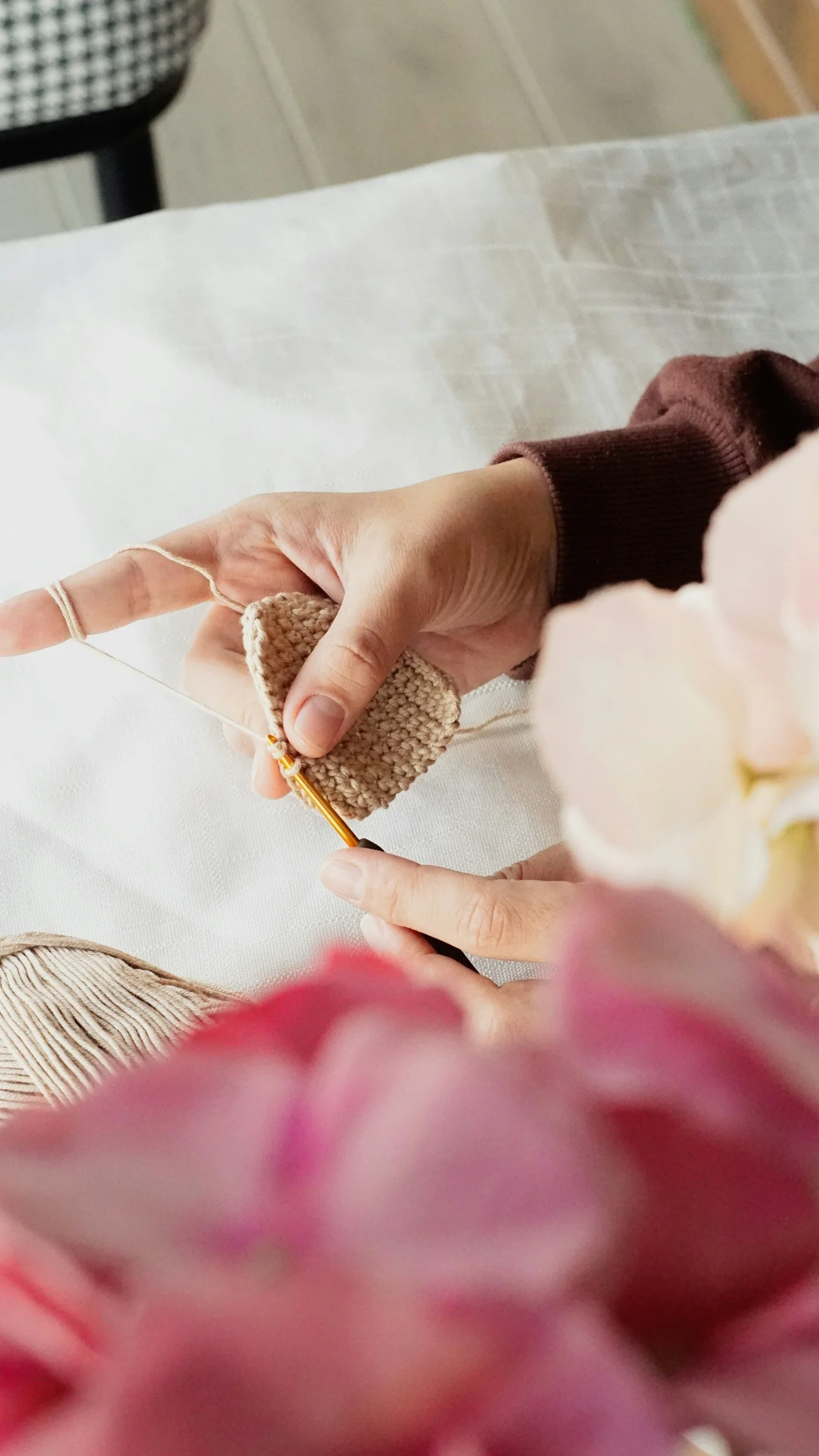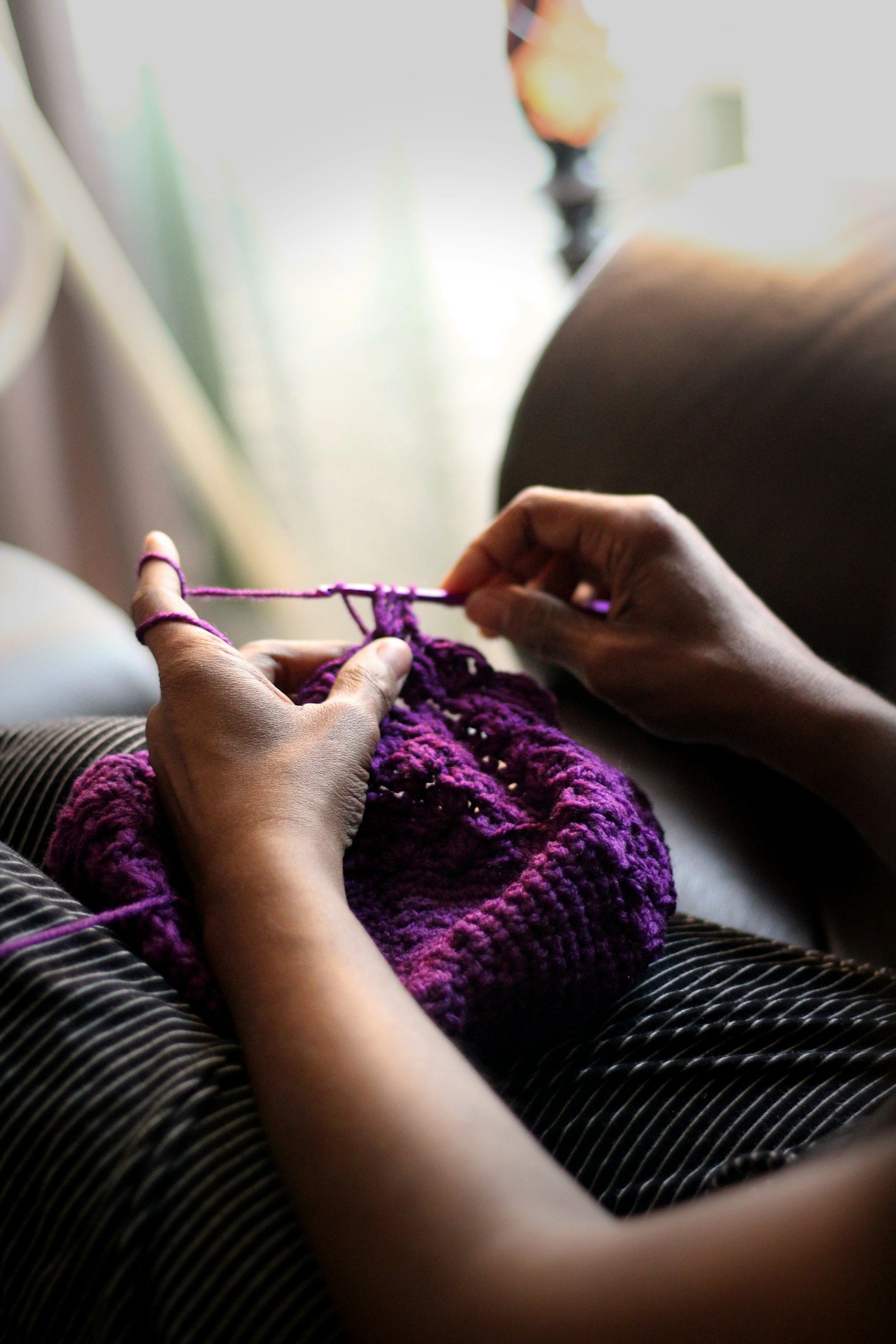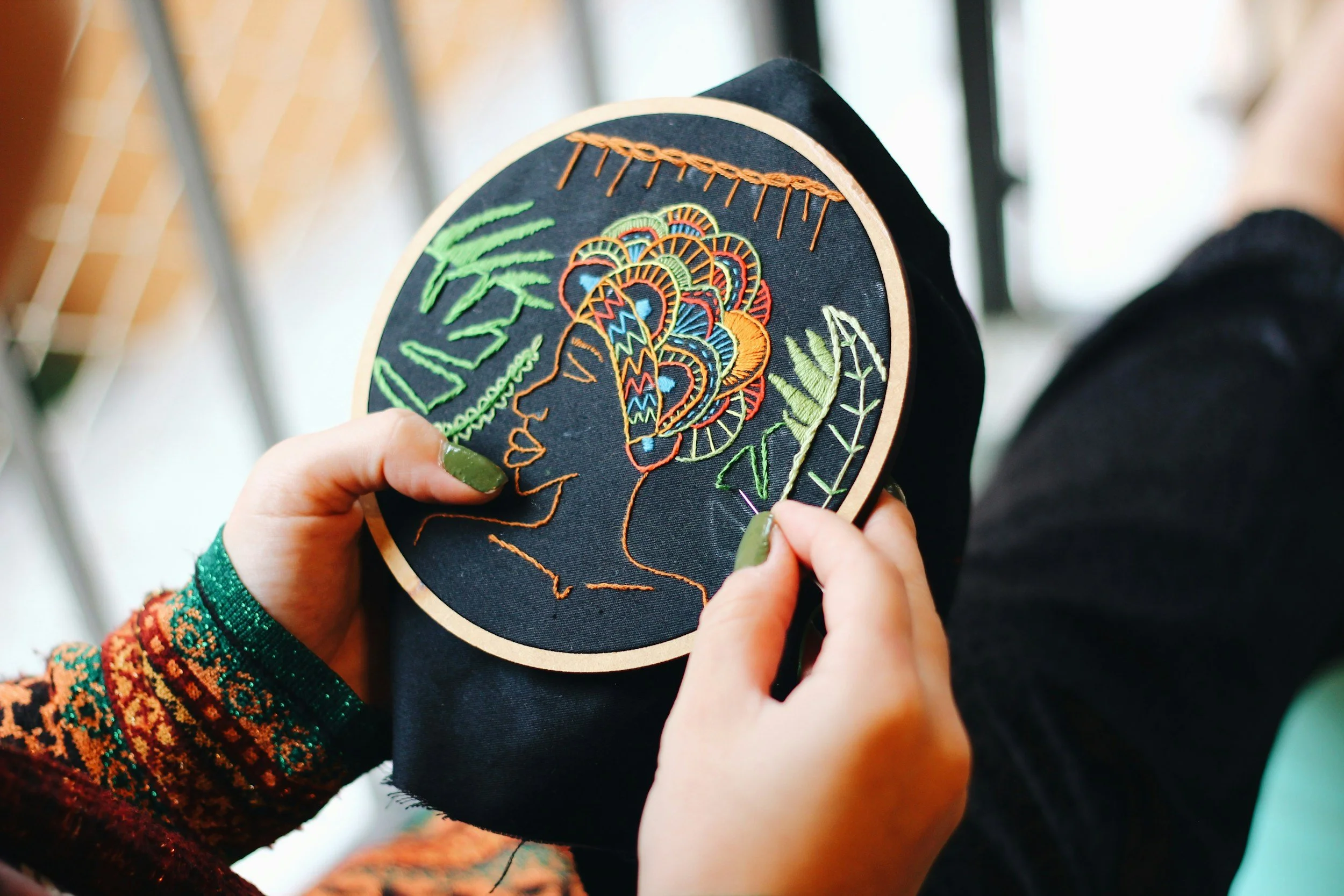
Therapeutic Fiber Arts
We offer fiber arts therapy, integrating practices such as knitting, weaving, embroidery, and other textile arts for those seeking embodied, creative expression. These tactile, rhythmic processes can offer grounding support for nervous system regulation, emotional processing, and grief work. Fiber arts invite us into a slower, intentional pace that supports integration and presence. For some, these practices also help to reconnect with ancestral traditions or cultural craft, reclaiming a lineage of care and creation through the hands.
Whether you're new to fiber work or have a long-standing practice, we meet you where you are. We currently offer fiber arts therapy in-person at our office in the Irving Park neighborhood of Chicago.
Areas of Clinical Specialty
LGBTQIA+: We offer affirming, therapeutic crafting for the LGBTQIA+ community. These practices can support identity exploration, soothe dysphoria, and provide space for self-expression beyond words. Whether you're processing discrimination or stitching your way toward chosen family, fiber arts inspire queer and trans creative healing through rhythm, ritual, and creativity.
ENM/Poly Folks: Therapeutic fiber arts offer a grounding way to process the fluidity and complexity of polyamorous life. Whether exploring new configurations, repairing ruptures, or navigating stigma, fiber work can support nervous system regulation and provide a tactile anchor for reflecting.
BDSM/Kink Community: For those in kink communities, fiber arts can offer a powerful modality for exploring control, surrender, sensation, and repair outside of pathologizing frameworks. We honor your practices and identities while offering space to unwind, reclaim agency, and stitch meaning.
Immigrants/Refugees: For immigrants, refugees, and first-generation individuals, fiber arts can serve as a bridge to ancestry, tradition, and healing. Whether you're navigating loss, displacement, or cultural negotiation, these tactile practices invite reconnection to self and lineage through hands-on, culturally sensitive care.
Substance Use: Therapeutic fiber arts can support those navigating substance use by offering a rhythmic outlet for emotion, craving, and self-regulation. Whether you're exploring sobriety, moderation, or your relationship to substances, we meet you with harm reduction, creativity, and care.
Chronic Illness/HIV: Fiber arts therapy meets you in your body, on your terms. For those living with chronic illness or HIV, slow, embodied practices can support pacing, pain management, grief, and autonomy. We honor your lived reality and offer a space to create with gentleness and intention.
Autism/ADHD/Neuroqueer: We affirm neurodivergence as natural variation, and fiber arts offer rich sensory experiences that can support regulation, expression, and pleasure. Our therapists tailor fiber work to suit your sensory and communication needs.
Multi-Cultural/Mixed-Race: For mixed-race and multicultural individuals, fiber arts can provide a way to hold complex identities with care. Through pattern, repetition, and material exploration, we create space for reconnection, belonging, and the weaving together of multifaceted heritage.
Artists/Performers/Craftsfolk: Whether fiber arts are new to you or deeply familiar, we understand the emotional and existential weight of creative life. Fiber-based therapy can support burnout recovery, process blocks, and reconnect you to your creative self without performance pressure or expectations.
Religious/Spiritual Trauma: For those healing from religious or spiritual trauma, fiber arts offer a grounding ritual and embodied repair. Whether you're stitching a new narrative, unraveling inherited shame, or exploring sacredness on your own terms, we hold space for reclamation and redefinition through craft.
Parenting: Therapeutic fiber arts support caregivers by offering a slow, calming space to process identity shifts, relational challenges, and daily overwhelm. For parents, these practices can create moments of reflection, restoration, and meaning.
Educators: For educators carrying the weight of emotional labor and systemic challenges, fiber arts offer a restorative practice. Whether you’re crafting through burnout or reflecting on your role as a mentor, these therapy sessions allow you to reconnect to yourself in quiet, textured ways.
Activists: In the context of justice work, fiber arts can be a radical act of care. Whether you’re processing grief, rage, or exhaustion, therapeutic sewing or crafting can create space for slowness, integration, and imagination. Our Chicago-based therapists honor activism as both labor and longing, and fiber as a medium for healing both.
Mad/Crip Folks: We offer fiber arts therapy rooted in disability justice and Mad/Crip pride. Whether you're seeking a gentler relationship with your body or navigating systems that demand compliance, therapeutic fiber arts invite autonomy, nonverbal expression, and joy in the rhythms of slowness and care.
What to Expect
No two therapy sessions look the same, especially when therapeutic crafting is part of the process. We begin by learning your biography, culture, neurotype, and temperament. Together, we’ll explore your reasons for seeking support, identify potential challenges, and determine how fiber-based practices like knitting, weaving, or embroidery might complement your therapeutic goals. Fiber arts therapy is one tool among many on the journey toward wellness—one that welcomes slowness, embodiment, and creativity.
Environment, identity, systems, and culture all shape our work together. Bringing your hands into the process can deepen emotional insight and make space for new kinds of healing. Exploring these elements can be joyful and meaningful.
Your first session is a space for mutual discovery. You’ll get to know your therapist just as much as they’ll be getting to know you. By the end of the appointment, we’ll discuss whether and how to move forward together. We’ll also review scheduling, payment, and office policies. Our goal is to help you feel welcome, centered, and supported as you begin a process of deeper connection with yourself and your community.
-
That’s completely okay, and actually quite common. You don’t need any experience with fiber crafts to benefit from this work. Fiber arts therapy isn’t about skill or artistic talent; it’s about process, presence, and exploration. We’ll start with simple, accessible techniques and move at your pace. Your therapist will guide you with curiosity and care, helping you discover what feels soothing, expressive, or meaningful.
-
We’ll always work with your body’s needs and preferences in mind. We can adapt materials, scale activities, or offer alternatives based on what feels safe and accessible for you. Sensory comfort and bodily autonomy are foundational to this work.
-
The psychotherapists at The Hinterlands are in-network with Blue Cross Blue Shield PPO and Aetna. We are out-of-network with all other insurance providers, including Medicaid and Medicare. Payment is due at the time of service.
If you're using out-of-network benefits, we’re happy to provide monthly superbills and statements to support your reimbursement process. We accept HSA cards, Zelle, and all major credit cards for payment.
-
We are committed to providing affordable fiber arts therapy in Chicago. We offer a range of cash-pay options, including sliding scale therapy sessions. These rates are based on therapist availability and the type of treatment, and typically range from $25 to the full session fee.
Sliding scale slots are limited and tend to fill quickly. During your intake call, you can ask your therapist whether they currently have sliding scale availability.




